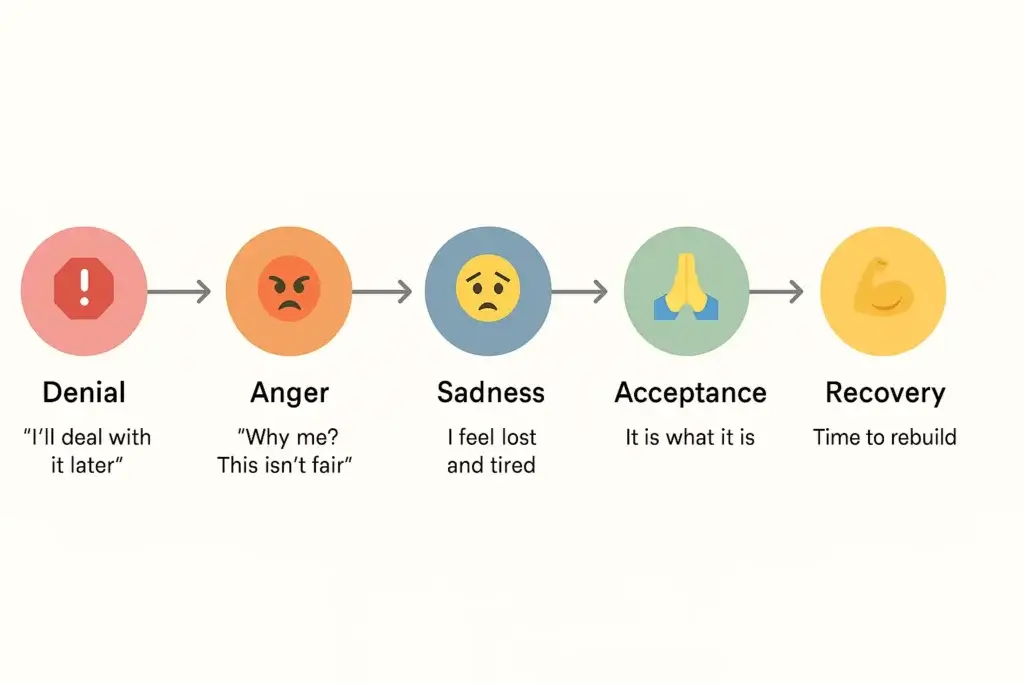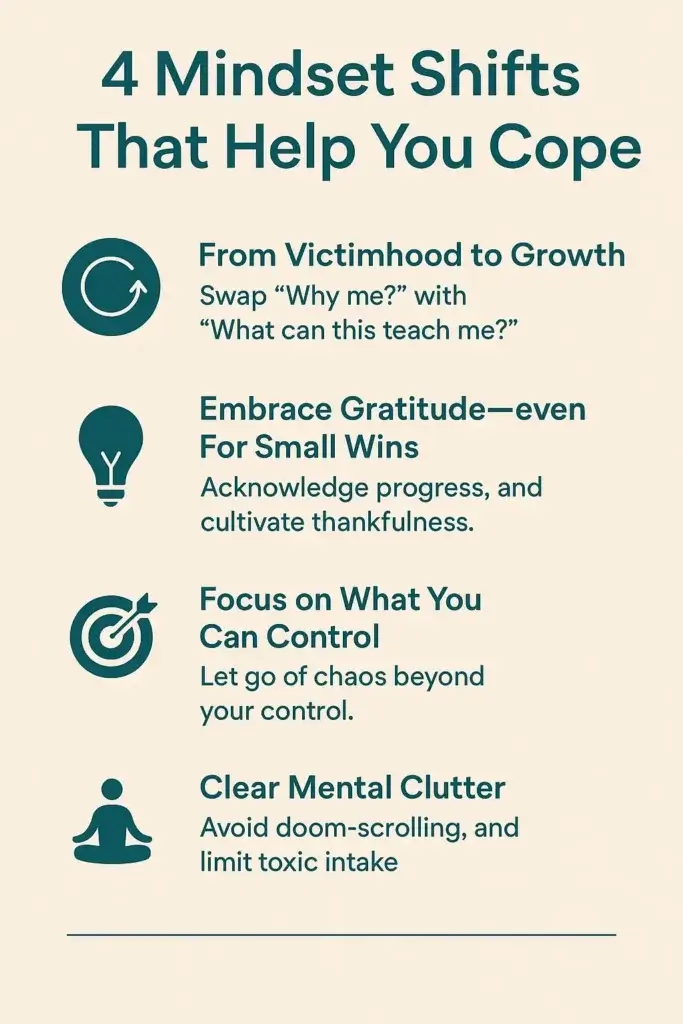
We have all had moments when everything feels like too much. Life seems out of sync — projects pile up at work, relationships feel strained, and despite our efforts, nothing moves as planned. It is in these phases that a heavy sense of stress, anxiety, and emotional fatigue takes over — what we commonly describe as feeling overwhelmed.
It does not matter if you are a student trying to keep up with your studies, a professional under pressure at work, a parent handling everything at home, or someone in a leadership role with others depending on you. Stress shows up in different ways. For some, it is the constant push of deadlines, shifting responsibilities, or financial strain. For others, it comes from more personal places — but the weight of it feels no less real.
For others, it is more personal — the quiet strain of a relationship under stress, a health issue that will not go away, or the deep worry that comes from not knowing if your children are truly okay. Whatever the source, the overwhelm feels real, and it touches all of us at some point.
What is required in these emotionally challenging moments is not perfection but positivity with perspective. The people who navigate life most effectively — the ones we admire as successful — are not those who avoid hardship; instead, they are those who persevere through it. They are the ones who learn to stay grounded, focused, and positive even when life feels overwhelming. Because no matter what we face, life doesn’t pause — it moves forward, and so must we.
But here’s the truth: staying positive doesn’t mean ignoring problems — it means changing the way we respond to them.
In this article, we’ll explore the emotional cycles of difficulty and share practical mindset shifts, simple habits, and personal reflections that help you build resilience, calm, and clarity in the face of chaos.
Stay with me — you might find just the shift you need.
Understanding the Emotional Cycles of Difficulty
When life feels overwhelming, we often find ourselves moving through a series of emotional stages — sometimes consciously, but often without even realizing it. These phases reflect the natural human response to stress, change, and uncertainty.
It often begins with denial — we dismiss the stress or hope things will fix themselves. But as reality persists, denial can quickly turn into anger, directed at others, the situation, or even ourselves. Eventually, we may slip into sadness — a space of helplessness, fatigue, or emotional shutdown.
With time and reflection, we move toward acceptance — not because we agree with everything that’s happening, but because we begin to recognize what’s within our control. Finally, we reach recovery, where energy, clarity, and emotional strength gradually return.
These stages are not flaws in our character — they’re part of being human. Our emotional systems are wired to respond this way. The more we suppress or ignore these feelings, the more powerfully they tend to resurface.
So be gentle with yourself. It’s okay not to be okay — don’t stay there forever. Once you begin to recognize and navigate these cycles with awareness, positivity shifts from being a vague idea to a practical, life-shaping skill.

Mindset Shifts That Help You Cope
When life becomes overwhelming, mindset is not just a coping mechanism — it is the foundation for how we interpret, respond to, and grow from adversity. It is what transforms a period of struggle into a turning point. Resilient people are not born with extraordinary strength; they cultivate a mental framework that allows them to adapt, reflect, and move forward with intention.
From “Why Me?” to “What Now?”
When things go wrong, it is only natural to ask, “Why is this happening to me?” Most of us have been there. But staying with that question for too long can leave us feeling stuck, caught in frustration, blame, or helplessness. The goal is not to shut down that voice, but to gently shift it.
Try asking instead:
“What is this situation trying to teach me?”
“How can I grow through this, not just get through it?”
This kind of shift does not make the pain disappear. But it does help you see it differently. It turns the focus from what is outside your control to what you can actually do. And once you stop fighting the moment and start working with it, you begin to see a way forward, even if just one small step at a time.
Practice Gratitude — Especially When It Feels Hard
In periods of stress or emotional exhaustion, progress is rarely dramatic. More often, it is measured in quiet, unseen wins. That is where gratitude becomes powerful — not as a cliché, but as a grounding habit.
Celebrate what seems small:
- Getting out of bed when you would rather not
- Completing a single task that once felt impossible
- Sitting in silence and feeling your breath return to rhythm
These small victories are not trivial. They are emotional footholds — reminders that even when life feels messy, you are still capable of movement, still capable of choice. Over time, this conscious gratitude becomes a form of quiet resilience, helping you restore emotional balance from the inside out.
Focus on What You Can Control
When life feels overwhelming, one of the hardest — and most important — things to remember is this: not everything is within your control. In fact, much of what drains us emotionally comes from trying to manage things that are not ours to fix — the news, other people’s behavior, unpredictable outcomes, or what might happen tomorrow.
The more we try to control the uncontrollable, the more powerless we begin to feel. That is where the spiral begins — into stress, anxiety, or burnout.
But there is another way.
Instead of getting lost in what you cannot change, shift your attention to what you can — your thoughts, your choices, your response in the moment. You may not be able to change the situation, but you can change how you show up inside it.
Even a small act — taking a deep breath, setting a boundary, or completing a simple task — can bring a sense of clarity and forward movement. And in times of chaos, that sense of groundedness makes all the difference.
Clear Mental Clutter
Stress often drives us to doom-scroll, binge negativity, or overload our senses with noise. Resist this impulse.
- Unfollow toxic content
- Limit screen time
- Choose calm over chaos
Simplicity restores your focus — and your peace.

Daily Practices That Build Resilience
As defined by the APA, resilience involves adapting successfully to challenging or stressful life events by maintaining mental, emotional, and behavioral flexibility.
Resilience is the ability to bounce back while staying grounded. It’s not inherited — it’s built. Here’s how you can start today:
Start Strong with a Morning Routine
Your mornings shape your day. Begin with 10–15 minutes of stillness and reflection. You can:
- Journal your thoughts or to-dos
- Say a short prayer or meditate
- Sit in silence by a window with your tea
This grounding creates space for clarity and motivation.
Move Your Body, Shift Your Mind
Movement resets your emotions. You don’t need the gym — try stretching, walking, or doing 3 minutes of yoga. Taking short physical breaks can help reduce mental fatigue and boost your mood.
Lean on Social Support
When you feel stressed and overwhelmed, don’t isolate yourself; instead, reach out to others for support. Make sure you talk to the people you trust — a friend, mentor, or partner. You’ll be surprised how much better you feel after being truly heard.
Micro-Goals: Small Wins, Big Shifts
Set tiny, manageable tasks:
- Make your bed
- Drink water
- Read 2 pages
- Tidy up a drawer
These victories, though small, help rebuild a sense of momentum and self-worth. For more insights on building resilience, read the Resources from APA.
Personal Reflection
After stepping down from a leadership role recently, I found myself in emotional burnout. What helped wasn’t some miracle, but routine. Each morning, I sat by my 23rd-floor window, tea in hand, writing down my day’s focus. I followed it with prayer and a long walk under the rising sun.
This small daily rhythm became my anchor — and helped me rediscover my energy, hope, and clarity. For more insights on building routines, read Habits Build Success: What You Do Daily Defines Your Career.
Conclusion: Choose Hope, One Step at a Time
If you are feeling overwhelmed, know this: you are not alone. Every human being has moments when life feels overwhelming.
But you don’t have to fix everything today.
Take one small step:
Pause for 5 minutes. Write a thought. Talk to someone. Go for a short walk.
That one step can shift your entire momentum.
You may not be able to control the storm, but you can learn to navigate it.
And every time you do, you build resilience that lasts.
If this post resonated with you or helped shift your perspective, I would love to hear from you. Reach out through the Contact page — your thoughts and experiences matter.
Curious to know more about who I am and why I write? Visit the About Me page.
Disclaimer: This article is based on personal experience and insights. It does not constitute financial, legal, or medical advice.




